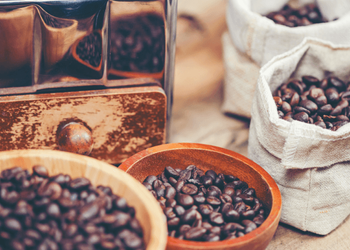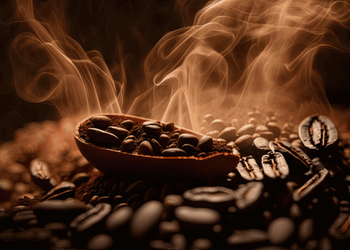
Coffee Roaster Industry: Strategies by the Frontrunners

Roasting machines in the coffee industry are used to alter the chemical & physical properties of coffee beans (green) into roasted coffee and coffee products with different colors, odors, flavors, and densities.
Green beans, also known as unroasted beans, contain the same amount of acids, caffeine, and protein as roasted beans, but lack the essential flavor. Freshly roasted coffee has several health benefits.
It has nutrients and antioxidants that strengthen the immune system and aid in the fight against cancer and other deadly diseases. The primary function of a coffee roasting machine is to create various coffee flavors.
Coffee roaster industry stats
One of the main factors fueling the market growth is the increasing demand for and the propensity of consumers to drink coffee across the world. In a survey by the Institute for Scientific Information on Coffee (ISIC), 68% of participants said they frequently drank coffee while working as of 2021.
According to Allied Market Research, the global coffee roaster market is projected to display a noteworthy CAGR from 2021 to 2031. The increased demand for efficient and user-friendly coffee roasting equipment is leading to a rise in the price of electric coffee roasters.
Also, for growth in the visibility of their brands, top companies are conducting experiments with coffee innovations like flavored coffee and RTD products so more and more customers are attracted.
For instance, on 18th January 2023, Blue Tokai Coffee Roasters raised $30 million in its Series B funding round, which it will use to expand its network of Indian stores and strengthen its B2B presence. There are currently 54 locations for the chain of Indian specialty coffee roasters and cafés throughout the country.
This funding will help the company open 200 new stores over the next three years. Blue Tokai highlights that the recent funding received represents the biggest investment in the Indian specialty coffee market to date, emphasizing the growing potential for premium coffee businesses in the country.
Role of the electric coffee roasters in the coffee roasting industry
Electric coffee roasters are gaining traction due to the rise in demand for convenient and advanced coffee roasting machines. Numerous pollutants, including nitrogen oxide, carbon monoxide, and carbon dioxide, are released by conventional gas-powered coffee roasters.
So, the shift towards electric coffee roasters is increasing. Automation and artificial intelligence (AI) have been used more frequently in coffee roasting over the past few years. By utilizing these advanced technologies, coffee roasters can precisely replicate roast profiles, and enhance data analysis and application, resulting in improved coffee quality.
The roaster can independently control all three methods of heat transfer, which include radiation, convection, and conduction. The X-Series roasters from Stronghold feature a drum system surrounded by a ceramic band heating system.
This feature enables the roaster to actively and deliberately regulate the temperature inside the drum, providing greater control over heat retention and dissipation.
How can the next-generation automated coffee roasting system help the roasting industry?
The next-generation automated coffee roasting system was launched by US coffee technology company, Bellwether Coffee in February 2022. The Series 2 Bellwether Automated Roasting System produces consistent qualitative results without gas lines, ventilation, or prior roasting experience.
The new device has a 50% extra hourly roasting capacity, which gives 3 roasts per hour. It also consists of an armless cooling tray and a 24-inch built-in touchscreen, which has improved its efficiency and durability.
On the other hand, Giesen launched its brand-new W6 Pro, in June 2022. The W6 Pro is a highly reliable machine line that is known for its exceptional capacity within the company.
The software regulates various hardware components, including the intake valve, stirrer, cooling fan, and discharge valve. It facilitates the automation of roasting processes, enabling the storage and implementation of specific roast profiles.
OCRI, a specialty coffee company with a presence in both the UK and New Zealand, announced its achievement of B Corp certification in September 2022.
OCRI claimed that its certification demonstrated that sustainability was at the heart of its global operations with initiatives like purchasing recyclable and compostable packaging and using bike couriers.
COVID-19 Impact on the Global Coffee Roaster Industry
The global coffee roaster market experienced a decline in growth during the pandemic. Due to supply chain disruptions and a shortage of skilled labor, there was a low growth rate.
Several lockdown guidelines issued by the government disrupted the transportation system. However, as the global situation began to normalize, many coffee roaster manufacturers also started focusing on research and development in order to put new concepts into practice and resume their growth post-pandemic.
In conclusion, the global coffee roaster market is expanding rapidly and is expected to reach an even higher level in the upcoming years.

I am a barista by profession hailing from NC. My journey began in my late teens when I started working as a barista in a local coffee shop. My passion for coffee quickly became evident as I immersed myself in the art of espresso extraction, latte art ...



